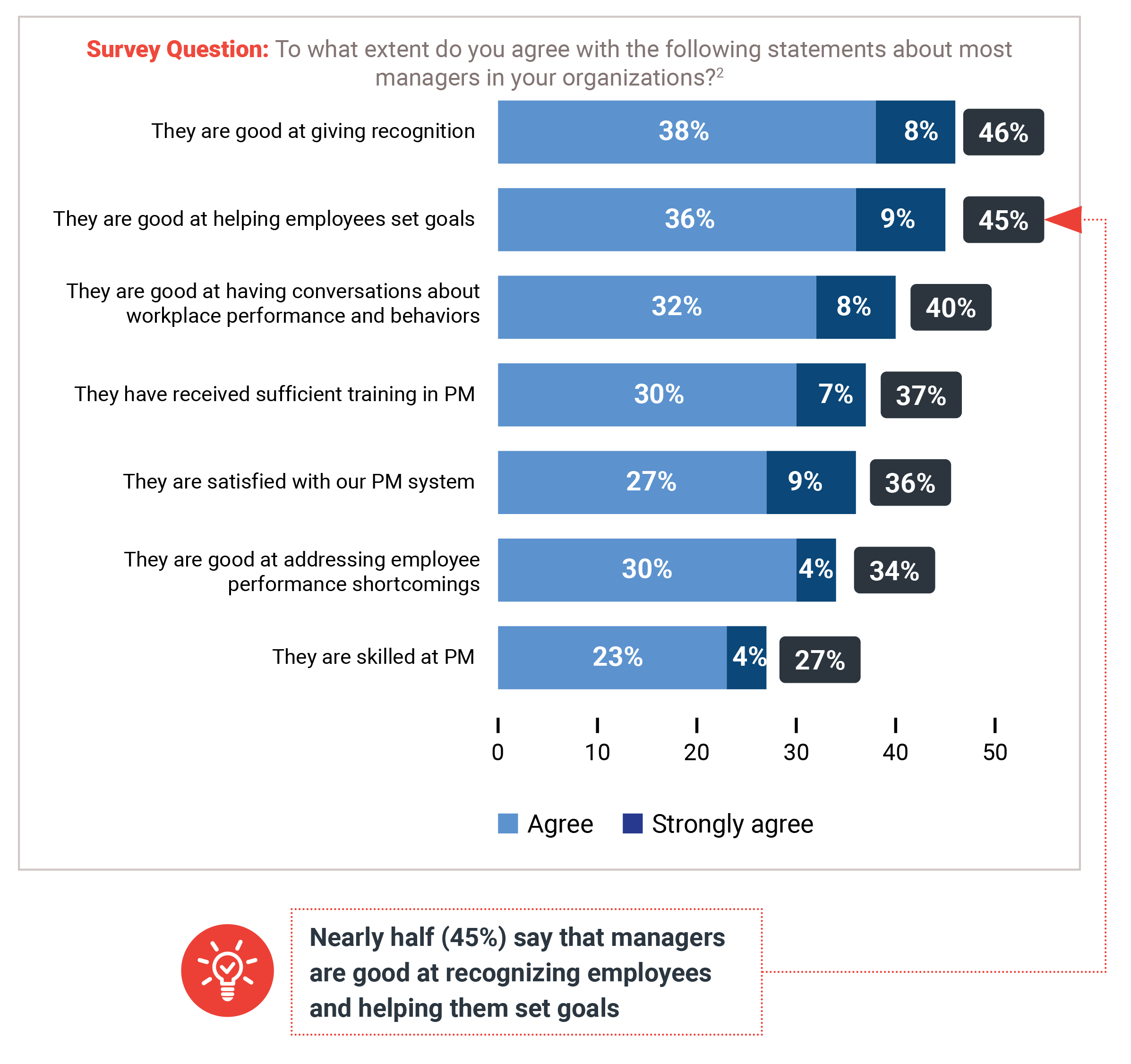Industry Research Summary: The State of Performance Management 2021
Improve performance management practices while adapting them to a fast-changing world
Posted on 08-17-2021, Read Time: - Min
Share:

HR.com’s HR Research Institute conducted an exclusive study to look at what organizations are doing, what they think is important, and what is working. We also detail how performance management has changed in response to the Covid-19 pandemic.
Key Findings
- most HR professionals report that the Covid-19 pandemic changed performance management in their organizations
- performance management tends to be directed at multiple goals
- manager ratings and “goals met” remain at the heart of PM, but other metrics and assessments are also becoming more widely used
- top leaders have divergent views on the value of performance management
- managers tend to have higher capabilities in some areas than others, but they generally need better performance management skills and training
- performance management has become a more frequent affair in many organizations
- performance management technologies are common, but even basic capabilities are often missing
The Prevalence of Performance Management
Performance management is a core process in the large majority of organizations, with 92% of respondents saying their organizations have a formal (60%) or informal system (9%), or some combination of the two (23%). Furthermore, of those who said their organizations do not have a system, most are planning to adopt one (7%).Performance Management Responses to the Pandemic
Fully 84% of respondents say their organizations have made changes to performance management due to the Covid-19 pandemic.Most organizations adjusted their performance management processes due to changed work arrangements that stemmed from the Covid-19 pandemic. It is still uncertain how many of those changes will be permanent as the pandemic recedes.

The Effectiveness of Performance Management
From all the criticism of PM processes in the media, you might think that they’re not effective at all. The data shows otherwise. More than half of respondents (57%) say their performance management process meets all company goals to a high or very high extent.1 More than half also say that to a high or very high extent it leads to:- better employee development
- improved employee performance
- increased employee engagement
The most common objective for performance management (69%) is to help employees learn and grow.
One-third of respondents say their performance management process does not include positive feedback and constructive criticism. Another serious concern is that only 40% say the system accurately portrays employee performance. It’s also worth noting that less than half of respondents (45%) say their process allows continuous feedback.
The Roles of Managers and Leaders
Only 27% of HR professionals agree that the managers at their organizations are skilled at overall performance management. However, nearly half (45%) say that managers are good at recognizing employees and helping them set goals.So, where are managers specifically lacking? Only 34% of HR professionals agree managers are good at addressing employee shortcomings.

Is Continuous Performance Management Being Adopted?
It’s interesting to see that in many organizations (50%), managers talk to employees about their career goals four or more times a year. One can imagine how different the employee experience is at these firms from the 33% of organizations where those career conversations only occur once a year or less.Conversations about performance happen even more frequently, with 65% of respondents saying they occur four or more times a year.
The Future of Performance Management
The one prediction on the future of performance management that was shared by more than half of the respondents (61%) is that PM will become more integrated with employee engagement and satisfaction data.Also interesting is the skepticism toward some other proposed changes. For example, some HR thinkers believe performance management should be based solely or primarily on conversations rather than ratings.
However, only 30% of participants think PM will “increasingly be based on verbal or written conversations rather than ratings.” Some HR thinkers have even advocated for eliminating performance management, but only a few respondents (15%) think that will happen.
On the other hand, about half of respondents think performance management will focus more on development activities, a finding that aligns with the often cited goal of helping individual employees learn and grow.
To learn more about The State of Performance Management 2021 study and to get strategic outcomes and 10 key takeaways from this exclusive HR.com Research Institute research, please read the complete report.
Note
1 This survey was conducted using two different survey panels: one made up of HR.com members and one from an external panel organization. On this question, there was an especially large discrepancy between the two panels. In the HR.com-only version of the survey, to which there were 129 respondents, only 32% of participants say that their organization’s PM management process results in ability to meet all organizational goals to a high or very high extent. The respective numbers for the other items were 31% for employee development, 30% for improved employee experience, and 29% for increased employee engagement.
2 For this question, we only used data from survey panel made up of HR.com members.
Error: No such template "/CustomCode/topleader/category"!

